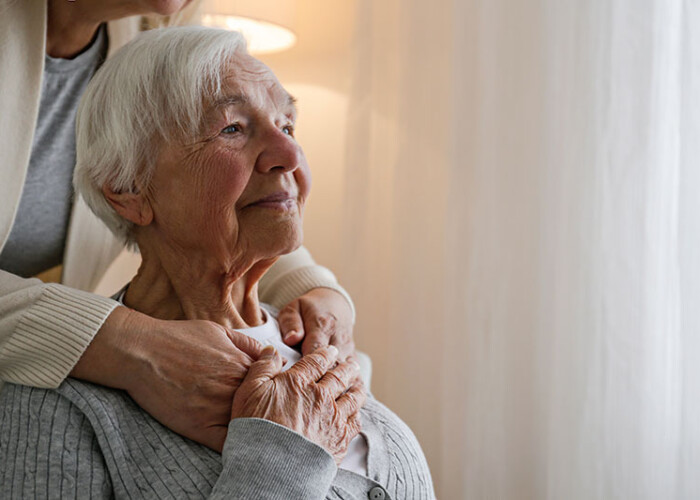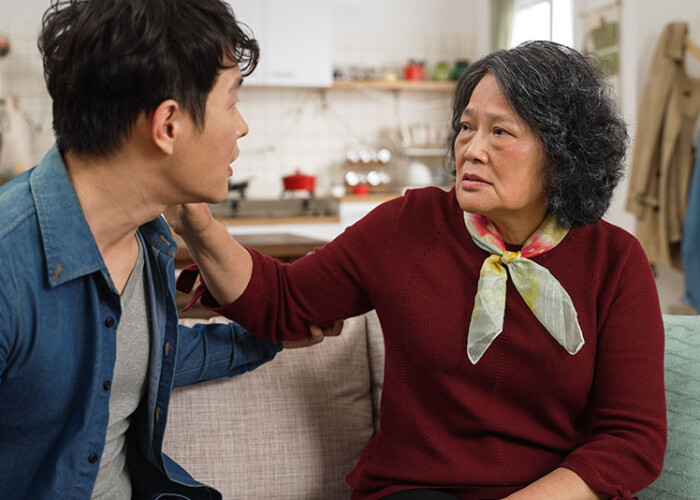Senior Care
What You Need to Know When Mom Is Discharged From the Hospital
When Mom is discharged from the hospital, keep an eye out for a condition known as post-hospital syndrome.
The moment Mom is discharged from the hospital, you exhale, believing the toughest part is finally behind you. But instead of bouncing back, she seems drained, anxious, or even weaker than before. She’s struggling with simple tasks, isn’t sleeping well, and feels overwhelmed.
This wasn’t how you pictured recovery. Instead of a turning point, it feels like she’s slipping backward.
What’s going on?
The Unexpected Challenge of Post-Hospital Recovery
Leaving the hospital doesn’t always mean the body is ready to heal. Many older adults experience post-hospital syndrome—a state of extreme stress and vulnerability that can slow recovery, lead to new health complications, and even increase the risk of readmission.
Stress plays a bigger role than you might realize.
How Stress … Read More »
Struggling to Let Someone Lighten Your Caregiving Load? This Might Be Why.
Learn why it’s so important to allow someone to help lighten your caregiving load, and why you may be feeling so resistant to the idea.
The moment Mom is discharged from the hospital, you exhale, believing the toughest part is finally behind you. But instead of bouncing back, she seems drained, anxious, or even weaker than before. She’s struggling with simple tasks, isn’t sleeping well, and feels overwhelmed.
This wasn’t how you pictured recovery. Instead of a turning point, it feels like she’s slipping backward.
What’s going on?
The Unexpected Challenge of Post-Hospital Recovery
Leaving the hospital doesn’t always mean the body is ready to heal. Many older adults experience post-hospital syndrome—a state of extreme stress and vulnerability that can slow recovery, lead to new health complications, and even increase the risk of readmission.
Stress plays a bigger … Read More »
Why Won’t Mom Eat? It Might Just Be an Eating Disorder.
If you’ve been wondering, “Why won’t Mom eat?” it’s important to know the signs of an eating disorder.
Changes in appetite and weight are often considered a normal part of aging. But if you find yourself asking, “Why won’t Mom eat?” it’s important to consider all possible reasons. While factors like medication side effects, dental concerns, or reduced mobility can certainly play a role, there’s another potential cause that often goes unnoticed: eating disorders in seniors.
How to Handle a Dementia Outburst in Public
If you’re unsure how to effectively defuse a dementia outburst in public, these strategies are for you!
Dementia is anything but predictable. A loved one’s mood, personality, and behaviors can shift without warning, making daily life feel like a constant balancing act. Managing these changes at home is one thing—but what about when you’re in a restaurant, grocery store, or waiting in line at the pharmacy; how should you handle a dementia outburst in public?
Read This Before Welcoming a New Caregiver Into the Home!
Welcoming a new caregiver into the home is a much smoother process with these tips.
The big day is here—your dad’s first day with his new caregiver! If your family is feeling a mix of relief, uncertainty, and even a little anxiety, you’re not alone. Welcoming a new caregiver into the home is a big adjustment, not just for the person receiving care, but for the entire family. The good news is that with some preparation, you can help set the stage for a positive, comfortable transition.
Recognizing and Resolving Senior Anxiety
If you suspect senior anxiety in someone you love, help is available.
Does an older adult you care about seem more withdrawn, restless, or forgetful than usual? While these changes may appear to be part of aging, they might actually indicate something deeper: senior anxiety.
Anxiety is more than just occasional worry or stress. In older adults, it can manifest in subtle or unexpected ways, including:
Persistent, obsessive thoughts
Recurrent nightmares that disrupt sleep
Repetitive behaviors, like checking and re-checking that appliances are off
Physical symptoms, such as sweating, dizziness, or a racing heart
Overreactions to otherwise manageable stressors
What Contributes to Anxiety in Aging Adults?
Aging brings unique challenges that may contribute to anxiety, including:
Side effects from medications
Chronic illnesses or reduced mobility
Grieving the loss of a loved one
Concerns about declining independence or financial stability
Unresolved childhood trauma
These factors, combined with changes in … Read More »
Six Rs to Improve Dementia Care
Use these six essential tips to improve dementia care for someone you love.
Caring for someone with dementia is one of the most meaningful yet challenging roles you can take on. It’s important to remind yourself regularly: You are doing your best. You are making a difference. A little self-affirmation goes a long way, but there’s more to consider when caregiving gets tough. Enter the Six Rs of dementia care—a framework designed to help improve dementia care and better manage the complexities of the disease.
What Are the Six Rs of Dementia Care?
The Six Rs offer a practical, compassionate approach to navigating difficult dementia-related behaviors. By following these steps, you can create a more peaceful, supportive environment:
Reassure
Dementia can make familiar routines and environments suddenly feel intimidating or strange. Loud noises, changes in lighting, unfamiliar visitors, or even … Read More »
How to Handle Loss of Recognition in Dementia
Loss of recognition in dementia is never easy to accept, but these tips will help.
You’ve been caring for your mom since her dementia diagnosis, doing your best to manage the ups and downs of the disease. One day, she looks at you with a blank stare or calls you by the name of someone else—a sibling, her spouse, or even her own parent. The sting of the loss of recognition in dementia is overwhelming. Should you correct her? Ignore it? Or embrace the new role she’s assigned you?
Recognition loss is one of dementia’s most heartbreaking effects. Watching someone you love struggle to connect the dots of who you are is never easy. However, how you respond in these moments can shape the interaction and bring peace to the person you love.
How to Respond to Recognition … Read More »
How to Be There for a Senior During a Temporary Assisted Living Stay
A temporary assisted living stay can be less overwhelming and more comfortable with these tips.
After a hospitalization or surgical procedure, the doctor may recommend a temporary assisted living stay before the person returns home. This is typically a short-term time of intensive therapy to promote healing and recovery. However, the thought of moving into a nursing home or assisted living facility even for a matter of weeks or months can be extremely difficult to accept.
Parkinson’s Communication Tips to Help You Stay Connected
Try these Parkinson’s communication tips to enhance your ability to connect with someone you love.
Imagine trying to share your thoughts, feelings, or even a simple idea with someone you love, only to feel as though your words are getting lost. Now, consider how isolating it must be if this were an everyday struggle. For someone living with Parkinson’s disease, this is often the reality. Communication becomes increasingly difficult as the disease progresses, creating frustration and emotional strain for both the person with Parkinson’s and their loved ones, making it crucial to know effective Parkinson’s communication tips. It begins with understanding how communication can be affected by the disease.

















